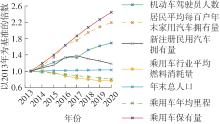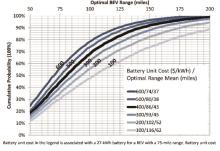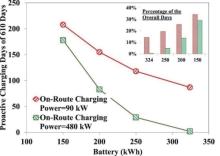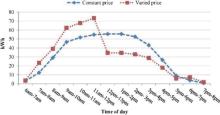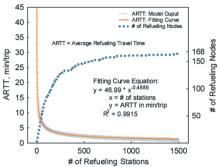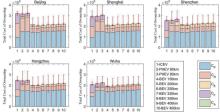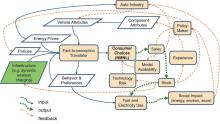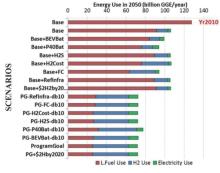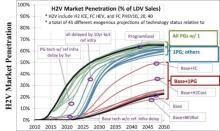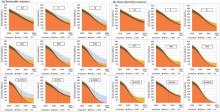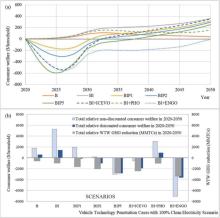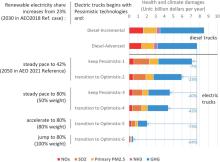Journal of South China University of Technology(Natural Science Edition) ›› 2025, Vol. 53 ›› Issue (1): 32-48.doi: 10.12141/j.issn.1000-565X.240238
• Energy, Power & Electrical Engineering • Previous Articles Next Articles
Review of Decision-Making Analysis for Transportation Energy Transition
CHEN Cuifeng1 LIN Zhenhong1,2 HUANG Chikun1 ZHAO Jinyao1 OU Shiqi1,2
- 1.South China University of Technology,Guangzhou 510006,Guangdong,China
2.Guangdong Artificial Intelligence and Digital Economy Laboratory (Guangzhou),Guangzhou 510335,Guangdong,China
-
Received:2024-05-20Online:2025-01-25Published:2025-01-02 -
Contact:林镇宏(1977—),男,博士,教授,博士生导师,主要从事能源转型、能源决策与分析、交通工程等研究。 E-mail:zhenhong@scut.edu.cn -
About author:陈翠峰(1977—),女,助理研究员,主要从事党建与思想政治、交通强国思想与建设实践研究。E-mail: cfchen@scut.edu.cn -
Supported by:the National Natural Science Foundation of China(52072130);Guangdong Basic and
CLC Number:
Cite this article
CHEN Cuifeng, LIN Zhenhong, HUANG Chikun, et al. Review of Decision-Making Analysis for Transportation Energy Transition[J]. Journal of South China University of Technology(Natural Science Edition), 2025, 53(1): 32-48.
share this article
Table 1
Estimated values of average fuel economy, average annual mileage and vehicle life expectancy by vehicle class in China and the United States[55]"
| 国家 | 车辆分类 | 平均燃油经济性/(英里·加仑-1) | 车辆年均行驶里程/英里 | 期望使用寿命/年 | |
|---|---|---|---|---|---|
| 中国 | 轿车 | 小型 | 35.91 | 7 510 | 13.76 |
| 中型 | 30.68 | 9 191 | |||
| 大型 | 29.16 | 10 332 | |||
| SUV/小型货车/小型SUV | 小型 | 30.69 | 9 273 | 15.32 | |
| 中型 | 26.15 | 9 982 | |||
| 大型 | 22.36 | 10 838 | |||
| 美国 | 轿车 | 小型 | 26.40 | 9 462 | 16.19 |
| 中型 | 26.01 | 10 434 | |||
| 大型 | 19.96 | 9 553 | |||
| SUV | 20.38 | 10 605 | 18.56 | ||
| 小型货车 | 19.55 | 11 478 | |||
| 轻型货车 | 16.18 | 10 449 | |||
| 1 | International Energy Agency .Explore energy data by ca-tegory,indicator,country or region[DB/OL].(2019-09-22)[2020-02-03].. |
| 2 | 侯梅芳 .碳中和目标下中国能源转型和能源安全的现状、挑战与对策[J].西南石油大学学报(自然科学版),2023,45(2):1-10. |
| HOU Meifang .Current situation, challenges and countermeasures of China’s energy transformation and energy security under the goal of carbon neutrality[J].Journal of Southwest Petroleum University (Science & Technology Edition),2023,45(2):1-10. | |
| 3 | 潘家华,董秀成,崔洪建,等 .欧洲能源危机及其影响分析[J].国际经济评论,2023(1):9-37. |
| PAN Jiahua, DONG Xiucheng, CUI Hongjian,et al .Analysis of European energy crisis and its impact[J].International Economic Review,2023(1):9-37. | |
| 4 | 刘仁厚,杨洋,丁明磊,等 .“双碳”目标下我国绿色低碳技术体系构建及创新路径研究[J].广西社会科学,2022(4):8-15. |
| LIU Renhou, YANG Yang, DING Minglei,et al .Research on the construction and innovation path of China’s green and low-carbon technology system under the goal of “double carbon”[J].Social Sciences in Guangxi,2022(4):8-15. | |
| 5 | 刘召峰,周冯琦 .全球城市之东京的环境战略转型的经验与借鉴[J].中国环境管理,2017,9(6):103-107. |
| LIU Zhaofeng, ZHOU Fengqi .The study on environment strategies transition of global city: the case of Tokyo[J].Chinese Journal of Environmental Management,2017,9(6):103-107. | |
| 6 | 张扬 .欧洲四国“绿色交通”考察(上)[J].交通与运输,2017,33(4):60-62. |
| ZHANG Yang .Study on “Green Transportation” in four European countries (Ⅰ)[J].Traffic & Transportation,2017,33(4):60 -62. | |
| 7 | 《乘用车燃料消耗量限值》强制性国家标准发布[J].环境技术,2021,39(1):5. |
| The mandatory national standard for fuel consumption li-mits for passenger vehicles was issued[J].Environmental Technology,2021,39(1):5. | |
| 8 | 朱星华,纽约州支持电动汽车发展的政策举措及其启示[J].全球科技经济瞭望,2014,29(6):13 -17. |
| ZHU Xing-hua .New York’s policies and initiatives on developing electric vehicles[J].Global Science,Technology and Economy Outlook,2014,29(6):13 -17. | |
| 9 | 刘佳佳,左兴权 .交叉口交通信号灯的模糊控制及优化研究[J].系统仿真学报,2020,32(12):2401-2408. |
| LIU Jiajia, ZUO Xingquan .Research on fuzzy control and optimization for traffic lights at single intersection[J].Journal of System Simulation,2020,32(12):2401-2408. | |
| 10 | 邹柠羽,朱家群,王学安 .城市停车标志交叉口交通信号灯智能控制仿真[J].计算机仿真,2019,36(3):189-192. |
| ZOU Ning-yu, ZHU Jia-qun, WANG Xue-an .City tra-ffic sign intersection signal light intelligent control simulation[J].Computer Simulation,2019,36(3):189-192. | |
| 11 | 敖仪斌,郑俊杰,肖珊,等 .农村居民交通行为研究方法、趋势与热点综述[J].华南理工大学学报(自然科学版),2023,51(10):31-45. |
| AO Yibin, ZHENG Junjie, XIAO Shan,et al .Review of research methods,trends and hotspots on rural residents’ transportation behavior[J].Journal of South China University of Technology (Natural Science Edition),2023,51(10):31-45. | |
| 12 | 严军华,王舒笑,袁浩然,等 .电动汽车能耗与气体排放分析及环境影响评价[J].华南理工大学学报(自然科学版),2018,46(6):137-144. |
| YAN Junhua, WANG Shuxiao, YUAN Haoran,et al .Life cycle assessment of energy consumption with emission and environmental impact of electric vehicle[J].Journal of South China University of Technology (Natural Science Edition),2018,46(6):137-144. | |
| 13 | ARIAS D A, SHEDD T A, JESTER R K .Theoretical analysis of waste heat recovery from an internal combustion engine in a hybrid vehicle[J].SAE Technical Paper,2006:777-784. |
| 14 | SUN Z, HEBBALE K .Challenges and opportunities in automotive transmission control[C]∥Proceedings of the 2005,American Control Conference.[S.l.]:IEEE,2005:3284-3289. |
| 15 | LIU H, HAN L, CAO Y .Improving transmission efficiency and reducing energy consumption with automotive continuously variable transmission:a model prediction comprehensive optimization approach[J].Applied Energy,2020,274:115303/1-13. |
| 16 | WAHEDI Y AL, TORRES A I, HASHIMI S AL,et al .Economic assessment of temperature swing adsorption systems as Claus tail gas clean up units[J].Chemical Engineering Science,2015,126:186-195. |
| 17 | LUO Y, TAN D .Study on the dynamics of the in-wheel motor system[J].IEEE Transactions on Vehicular Technology,2012,61(8):3510-3518. |
| 18 | LI J, XIE C, BAO Z .Optimal en-route charging station locations for electric vehicles: a new modeling perspective and a comparative evaluation of network-based and metanetwork-based approaches[J].Transportation Research Part C:Emerging Technologies,2022,142:103781/1-46. |
| 19 | OU S, ZHANG S, LIN Z,et al .A method for determining optimal electric range by considering electric vehicle lightweighting on perceived ownership cost[J].Journal of Cleaner Production,2023,385:135606/1-40. |
| 20 | LIN Z .Optimizing and diversifying electric vehicle driving range for U.S. drivers[J].Transportation Science,2014,48(4):635-650. |
| 21 | LIN Z, XIE F,OU S .Modeling the external effects of air taxis in reducing the energy consumption of road traffic[J].Transportation Research Record,2020,2674(12):176-187. |
| 22 | GAO Z, LIN Z, LACLAIR T J,et al .Battery capacity and recharging needs for electric buses in city transit service[J].Energy,2017,122:588-600. |
| 23 | BRONIEWICZ E, OGRODNIK K .Multi-criteria analysis of transport infrastructure projects[J].Transportation Research Part D: Transport and Environment,2020,83:102351/1-15. |
| 24 | SONG S, LI T, LIU P,et al .The transition pathway of energy supply systems towards carbon neutrality based on a multi-regional energy infrastructure planning approach: a case study of China[J].Energy,2022,238:122037/1-10. |
| 25 | GILLESSEN B, HEINRICHS H, HAKE J F,et al .Natural gas as a bridge to sustainability: infrastructure expansion regarding energy security and system transition[J].Applied Energy,2019,251:113377/1-16. |
| 26 | BI C, JIA M, ZENG J .Nonlinear effect of public infrastructure on energy intensity in China:a panel smooth transition regression approach[J].Sustainability,2019,11(3):629/1-21. |
| 27 | 孙传旺,罗源,姚昕 .交通基础设施与城市空气污染——来自中国的经验证据[J].经济研究,2019,54(8):136-151. |
| SUN Chuanwang, LUO Yuan, YAO Xin .The effects of transportation infrastructure on air quality:evidence from empirical analysis in China[J].Economic Research Journal,2019,54(8):136-151. | |
| 28 | 泮楚微,杨传明 .交通基础设施、经济高质量发展与碳排放复杂关联分析[J].中国储运,2024(5):158-159. |
| PAN Chuwei, YANG Chuanming .Complex correlation analysis of transportation infrastructure,high-quality economic development and carbon emissions[J].China Storage & Transport,2024(5):158-159. | |
| 29 | PETERSON D .Addressing challenges to electric vehicle charging in multifamily residential buildings[R].Los Angeles:UCLA Luskin School of Public Affairs,2011. |
| 30 | LI S, XIE F, HUANG Y,et al .Optimizing workplace charging facility deployment and smart charging strategies[J].Transportation Research Part D:Transport and Environment,2020,87:102481/1-12. |
| 31 | 施博文,余敏,许晓敏,等 .“双碳”目标下超大型城市氢能汽车的应用[J].信息与管理研究,2023,8(2/3):40-51. |
| SHI Bowen, YU Min, XU Xiaomin,et al .Hydrogen vehicle application in super-large cities on dual carbon target[J].Journal of Information and Management,2023,8(2/3):40-51. | |
| 32 | LIN Z, OGDEN J, FAN Y,et al .The fuel-travel-back approach to hydrogen station siting[J].International Journal of Hydrogen Energy,2008,33(12):3096-3101. |
| 33 | GUO Y, SOUDERS D, LABI S,et al .Paving the way for autonomous vehicles: understanding autonomous vehicle adoption and vehicle fuel choice under user heterogeneity[J].Transportation Research Part A:Policy and Practice,2021,154:364-398. |
| 34 | JIAN S, RASHIDI T H, DIXIT V .An analysis of carsharing vehicle choice and utilization patterns using multiple discrete-continuous extreme value (MDCEV) mo-dels[J].Transportation Research Part A:Policy and Practice,2017,103:362-376. |
| 35 | GOLOB T F, BUNCH D S, BROWNSTONE D .A vehicle use forecasting model based on revealed and stated vehicle type choice and utilisation data[J].Journal of Transport Economics and Policy,1997,31(1):69-92. |
| 36 | ANDERSON J E, LEHNE M, HARDINGHAUS M .What electric vehicle users want:real-world preferences for public charging infrastructure[J].International Journal of Sustainable Transportation,2018,12(5):341-352. |
| 37 | SHBEEB L .How users perceive infrastructure development affects their transport mode choice[J].Journal of Transportation Technologies,2023,13(4):545-598. |
| 38 | HAO X, LIN Z, WANG H,et al .Range cost-effectiveness of plug-in electric vehicle for heterogeneous consumers:an expanded total ownership cost approach[J].Applied Energy,2020,275:115394/1-19. |
| 39 | DONG J, LIN Z .Within-day recharge of plug-in hybrid electric vehicles: energy impact of public charging infrastructure[J].Transportation Research Part D,2012,17(5):405-412. |
| 40 | GREIM P, SOLOMON A A, BREYER C .Assessment of lithium criticality in the global energy transition and addressing policy gaps in transportation[J].Nature Communications,2020,11(1):4570/1-11. |
| 41 | REHMAN F U, ISLAM M M, MIAO Q .Environmental sustainability via green transportation:a case of the top 10 energy transition nations[J].Transport Policy,2023,137:32-44. |
| 42 | SOLOMON B D, KRISHNA K .The coming sustainable energy transition:History,strategies,and outlook[J].Energy Policy,2011,39(11):7422-7431. |
| 43 | MARKARD J .The next phase of the energy transition and its implications for research and policy[J].Nature Energy,2018,3(8):628-633. |
| 44 | LINDBERG M B, MARKARD J, ANDERSEN A D .Policies, actors and sustainability transition pathways:a study of the EU’s energy policy mix[J].Research policy,2019,48(10):103668/1-15. |
| 45 | HAN S, ZHANG B, SUN X,et al .China’s energy transition in the power and transport sectors from a substitution perspective[J].Energies,2017,10(5):600/1-25. |
| 46 | LIN Z, DONG J, GREENE D L .Hydrogen vehicles: impacts of DOE technical targets on market acceptance and societal benefits[J].International Journal of Hydrogen Energy,2013,38(19):7973-7985. |
| 47 | OU S, LIN Z, JIANG Y,et al .Quantifying policy gaps for achieving the net-zero GHG emissions target in the U.S. light-duty vehicle market through electrification[J].Journal of Cleaner Production,2022,380(P2):135000/1-13. |
| 48 | DOMINKOVIĆ D F, BAČEKOVIĆ I, PEDERSEN A S,et al .The future of transportation in sustainable energy systems: opportunities and barriers in a clean energy transition[J].Renewable and Sustainable Energy Reviews,2018,82:1823-1838. |
| 49 | BOGDANOV D, GULAGI A, FASIHI M,et al .Full energy sector transition towards 100% renewable energy supply: integrating power, heat, transport and industry sectors including desalination[J].Applied Energy,2021,283:116273/1-17. |
| 50 | HANSEN K, BREYER C, LUND H .Status and perspectives on 100% renewable energy systems[J].Energy,2019,175:471-480. |
| 51 | PYE S, SABIO N, STRACHAN N .An integrated systematic analysis of uncertainties in UK energy transition pathways[J].Energy Policy,2015,87:673-684. |
| 52 | SALTELLI A, ANNONI P .How to avoid a perfunctory sensitivity analysis[J].Environmental Modelling & Software,2010,25(12):1508-1517. |
| 53 | TONG F, JENN A, WOLFSON D,et al .Health and climate impacts from long-haul truck electrification[J].Environmental Science & Technology,2021,55(13):8514-8523. |
| 54 | LIN Z .Mostly positive implications of long-haul truck electrification[J].Joule,2021,5(10):2548-2550. |
| 55 | OU S, LIN Z, WANG C .Improving the effectiveness and equity of fuel economy regulations with sales adjustment factors[J].iScience,2022,25(9):104902/1-22. |
| 56 | US Department of Transportation .National Household Travel Survey[R].Washington D C:US Department of Transportation,2017. |
| 57 | OU S, YU R, LIN Z,et al .Intensity and daily pattern of passenger vehicle use by region and class in China:estimation and implications for energy use and electrification[J].Mitigation and Adaptation Strategies for Global Change,2019,25(3):307-327. |
| 58 | ZHENG S, HUO Y .Low carbon urban spatial structure: a study from the personal vehicle travel perspective[J].World Econ Pap,2010(6):50-65. |
| 59 | GREENE D L, WELCH J G .Impacts of fuel economy improvements on the distribution of income in the U.S.[J].Energy Policy,2018,122:528-541. |
| 60 | 李丹阳,陈文颖 .碳中和目标下全球交通能源转型路径[J].气候变化研究进展,2023,19(2):203-212. |
| LI Dan-yang, CHEN Wen-ying .Global transportation energy transition pathways towards carbon neutrality[J].Climate Change Research,2023,19(2):203-212. |
| [1] | ZUO Bin, DONG Tianhang, ZHANG Zehui, WANG Huajun, HUO Weiwei, GONG Wenfeng, CHENG Junsheng. Proton Exchange Membrane Fuel Cell Fault Prediction Method Based on Deep Learning [J]. Journal of South China University of Technology(Natural Science Edition), 2025, 53(7): 21-30. |
| [2] | LOU Bo, LI Senhao, LU Song, et al. Kinetic Mechanism of Pyrolysis of Lilac Lignin Dimer Memes [J]. Journal of South China University of Technology(Natural Science Edition), 2023, 51(12): 107-117. |
| [3] | ZHOU Xuan, WANG Xinyao, YAN Junwei, et al. Anomaly Detection of Complex Building Energy Consumption System Based on Machine Learning [J]. Journal of South China University of Technology(Natural Science Edition), 2022, 50(7): 144-154. |
| [4] | ZHANG Yan CHU Xiao-li LIU Yong-qiang. Cold Transmitting Control and Terminal Cold Adjusting of District Cooling System [J]. Journal of South China University of Technology (Natural Science Edition), 2017, 45(10): 26-33. |
| [5] | Zhao Yi-fan Liu Yong-shan Du Gang. Telematics for Power Battery System of Electric Vehicles [J]. Journal of South China University of Technology (Natural Science Edition), 2014, 42(8): 136-142,148. |
| Viewed | ||||||
|
Full text |
|
|||||
|
Abstract |
|
|||||
